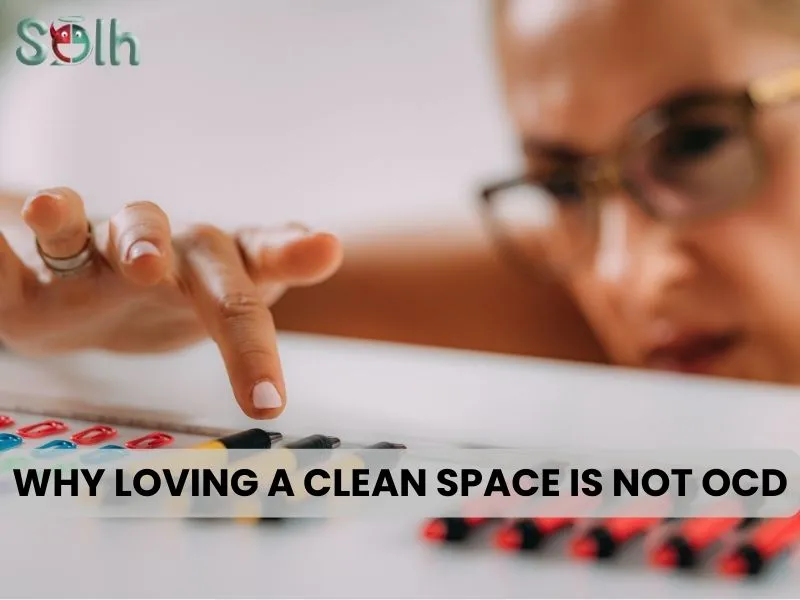The admiration of orderliness by many individuals and keeping the house neat are sometimes associated with being disciplined, organized and having respect for oneself. However, at times, there is a misconception or mislabelling of the desire for a clean space as Obsessive-Compulsive Disorder (OCD). This blog will explain why it is wrong to confuse a 'preference for cleanliness' with 'Obsessive Compulsive Disorder' and why one should not see the desire to keep spaces clean and tidy as a disorder.
Obsessive-Compulsive Disorder (OCD) can be defined as a chronic and disabling mental health condition characterized by:-
| OBSESSION | COMPULSION |
| Obsessions are any recurrent thought,image,urge or impulse. | Compulsions are any action, ritual or behavior to reduce the anxiety caused by obsession. |
Common obsessions include contamination fears, intrusive thoughts about harm classified as onychotillomania, trichotillomania, blasphemous thoughts and arrangement need seen in order, arrangements and symmetry according to the Diagnostic and Statistical Manual of Mental Disorders Fifth Edition (DSM-V). Compulsions may entail repetitive behaviors such as washing hands or checking. These behaviors are often accompanied by magical thinking.
OCD is not just about wanting things to be clean or organized; it is about experiencing significant distress and anxiety from these obsessions and compulsions. Individuals with OCD often spend a considerable amount of time each day (more than one hour) engaged in these thoughts and behaviors, which can severely impact their daily functioning and quality of life.
The Desire for Cleanliness: A Normal Preference
On the other hand, wanting a clean and organized space is a common preference that many people hold. This desire is rooted in various psychological and practical reasons. Clean spaces are often associated with a sense of order and control, which can reduce stress and increase productivity. A tidy environment can also be more aesthetically pleasing and hygienic, contributing to a person's overall well-being.
It's important to recognize that the motivation behind keeping a space clean is often rational and manageable. For most people, the act of cleaning is not driven by obsessive thoughts or an overwhelming need to perform rituals to alleviate anxiety. Instead, it is a conscious choice made to enhance their living conditions.
Key Differences Between OCD and a Preference for Cleanliness
To further clarify why loving a clean space is not OCD, it is crucial to understand the key differences between the two:
Nature of Thoughts:
- OCD: Involves intrusive and distressing thoughts that are often irrational. For instance, an individual might fear that not cleaning their hands repeatedly will result in severe illness.
- Preference for Cleanliness: Thoughts about cleanliness are generally rational and proportionate. A person might simply enjoy the appearance of a tidy room or the efficiency it brings.
Emotional Response:
- OCD: Cleaning and organizing are often performed to alleviate intense anxiety or distress caused by obsessions. The relief is usually temporary, leading to repetitive cycles.
- Preference for Cleanliness: Cleaning brings satisfaction and a sense of accomplishment. The process is usually not distressing and doesn't lead to repetitive compulsion.
Impact on Daily Life:
- OCD: Significantly disrupts daily functioning. The compulsions take up excessive time and interfere with work, relationships, and overall quality of life.
- Preference for Cleanliness: Enhances daily functioning. A clean environment can improve focus, efficiency, and mental clarity.
Control Over Behavior:
- OCD: Individuals feel compelled to perform cleaning rituals even when they recognize them as excessive or unreasonable. They often struggle to control these behaviors.
- Preference for Cleanliness: Individuals have control over their cleaning habits. They can choose when and how much to clean without feeling compelled by distressing thoughts.
To sum it up, we need to understand that the preference to clean spaces or keeping them organized does not come as a result of a habit that causes anxiety.
The Benefits of a Clean Space
Maintaining a clean space has numerous benefits that contribute to overall well-being, which further underscores why this preference should not be stigmatized or mistaken for OCD.
Mental Clarity and Focus: A tidy environment reduces visual clutter, which can help improve focus and productivity. When everything is in its place, it is easier to concentrate on the tasks at hand without being distracted by disorganization.
Reduced Stress: Clean spaces can have a calming effect. Knowing that your environment is orderly can reduce feelings of chaos and stress, providing a more serene and controlled atmosphere.
Health and Hygiene: Regular cleaning reduces the buildup of dust, mold, and allergens, contributing to better health. A clean kitchen, for example, prevents the growth of bacteria and reduces the risk of foodborne illnesses.
Positive Social Interactions: A well-maintained space is more inviting and can improve social interactions. Whether it's hosting friends or family, a clean home creates a welcoming and comfortable atmosphere.
Enhanced Mood: The act of cleaning itself can be therapeutic. Engaging in physical activity, coupled with the visible results of a tidy space, can boost mood and provide a sense of achievement.
To reduce misconceptions about OCD, it is crucial to promote mental health literacy. This involves educating the public about the nature of OCD, its symptoms, and its impact on individuals' lives. For instance, understanding that OCD is a serious condition requiring professional treatment can help differentiate it from everyday preferences and habits.
Education Campaigns: Public health campaigns can play a pivotal role in disseminating information about OCD. These campaigns should emphasize that OCD is characterized by persistent, intrusive thoughts (obsessions) and repetitive behaviors (compulsions) that an individual feels compelled to perform. Highlighting real-life stories of those who live with OCD can help demystify the condition and demonstrate its severity. Utilizing social media, television, and community events can ensure the message reaches a wide audience. Partnering with mental health organizations and professionals can enhance the credibility and impact of these campaigns.
Mental Health in Schools: Incorporating education about OCD into school curricula is essential for early intervention and fostering empathy. Programs can teach students about the symptoms of OCD , such as excessive cleaning, checking, or counting rituals, and the significant distress and impairment these behaviors cause. Training teachers and school staff to recognize signs of OCD and provide appropriate support can create a more inclusive and understanding school environment. Establishing peer support groups and mental health clubs can further promote awareness and reduce stigma among students.
Workplace Mental Health: Promoting mental health literacy about OCD in the workplace can lead to a more supportive environment for employees. Employers can offer workshops and training sessions to educate staff about the nature of OCD, emphasizing that it is not simply a matter of personal preference or a quirk but a debilitating condition that requires understanding and appropriate accommodations. Providing resources such as Employee Assistance Programs (EAPs) and access to mental health professionals can help employees manage their symptoms and maintain productivity.
Community Outreach: Community-based initiatives can significantly enhance understanding and acceptance of OCD. Local health departments, non-profits, and community centers can organize informational sessions, support groups, and mental health fairs focused on OCD. These events can provide valuable resources and create a network of support for individuals with OCD and their families. Partnering with religious organizations, cultural groups, and other community leaders can help reach diverse populations and address specific cultural attitudes towards mental health and OCD.
Media Representation: Accurate portrayals of OCD in the media are essential to counteract stereotypes and misconceptions. Media professionals should be trained to depict OCD with sensitivity and accuracy, avoiding trivialization or sensationalism. Highlighting the challenges and triumphs of individuals living with OCD can provide a balanced perspective and foster greater understanding. Collaborations between media outlets and mental health organizations can ensure that content is both informative and respectful.
Research and Evaluation: Ongoing research is vital to assess the effectiveness of various initiatives aimed at promoting OCD literacy. Evaluating the impact of public health campaigns, educational programs, and community outreach efforts can identify the most effective strategies. Gathering data on public attitudes and knowledge about OCD can help refine future initiatives to address specific gaps and misconceptions. Investing in research can also contribute to the development of new strategies and interventions to enhance OCD literacy.
Enjoying a clean and organized space is a preference, not a mental health disorder. It can contribute to feelings of calm, focus, and accomplishment. While someone with OCD might also appreciate a clean space, their motivations and the level of distress caused by mess are distinct. If maintaining cleanliness becomes all-consuming or anxiety-provoking, seeking professional help is crucial. But for the rest of us, there's no shame in simply preferring a clutter-free haven to unwind in.
Solh can be a helpful tool to support someone with OCD and other mental health challenges, but it's important to understand its role as part of a larger approach. Here's how Solh's features can be relevant:
Normalizes Seeking Help: Solh combats the stigma often associated with mental health by creating a judgment-free zone. This can be encouraging for someone struggling with OCD to reach out for professional help.
Anonymous Support Groups: Connecting with others who understand OCD can be invaluable. Sharing experiences and realizing they're not alone can be a powerful source of comfort and motivation.
Talk Now: The easy access to confidential consultations through the app can be a great first step for someone with OCD who might hesitate about traditional in-person therapy.
Download the Solh App Now!




